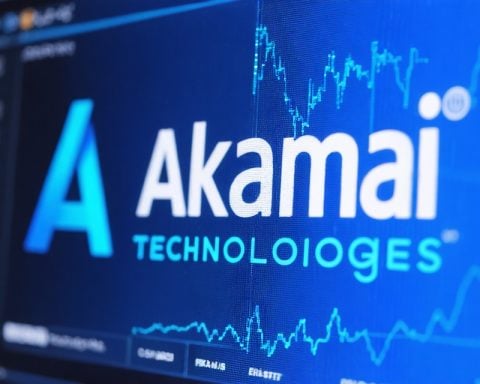Nvidia’s Recent Stock Surge
Nvidia’s shares experienced a significant boost on Tuesday, climbing over 4% and nearing their highest-ever closing value of $146. This resurgence also contributed to a rise in the tech-heavy Nasdaq index. Anticipation is building as investors gear up for Nvidia’s quarterly earnings report, expected to be pivotal for the stock market.
Market Implications
Ahead of Nvidia’s eagerly awaited third-quarter earnings release scheduled for Thursday evening, analysts predict the outcome could substantially influence market trends. Experts assert that Nvidia is a key force in the current financial landscape and its results might steer market direction in the near future.
Strategic Insights
According to market observers, options traders perceive greater turbulence for the S&P 500 index on Friday than in upcoming economic updates or Federal Reserve meetings. Notably, Nvidia’s weight within the index is significant, comprising over 7% of its valuation.
Financial Outlook
Wall Street analysts are optimistic, expecting Nvidia to continue its strong performance streak with record earnings and revenue figures. Nvidia is projected to achieve a remarkable growth rate exceeding 80% for both revenue and profits year-over-year in the third quarter.
Contextual Background
Nvidia, now the most valuable public company globally, commands a formidable presence in the AI accelerator market. Its market capitalization has surged dramatically alongside its financial gains, driven by the burgeoning generative AI sector. This rapid growth has positioned Nvidia as a dominant player alongside tech giants like Apple and Microsoft. With a net worth estimated at $127 billion, Nvidia CEO Jensen Huang ranks as the ninth-richest person worldwide.
Nvidia’s Unstoppable Rise: The AI Revolution and Its Global Impact
Introduction
Following Nvidia’s recent stock surge and anticipation surrounding its quarterly earnings report, the broader implications of this financial ascent extend beyond the stock market. The company’s advances in artificial intelligence (AI), particularly in generative AI, are set to transform industries, redefine job markets, and reshape economies. This article delves into these transformative impacts, highlighting under-discussed aspects and exploring how this growth affects different facets of society.
The AI Transformation: More Than Just Numbers
While Nvidia’s market success is noteworthy, the real story lies in its role in advancing AI technologies. Nvidia’s GPUs power many AI applications, including autonomous vehicles, healthcare diagnostics, and even creative industries like music and art generation. This technological backbone is enabling rapid advancements in sectors previously limited by computational power.
Affecting Industries and Employment
In manufacturing, AI-driven robotics, powered by Nvidia’s technology, are automating processes, leading to more efficient production systems. However, this automation often raises concerns about job displacement. While some jobs may become obsolete, new roles in AI management, development, and oversight are emerging, requiring re-skilling and adaptation from the workforce.
Global Economic Shifts
Countries heavily investing in AI technology, such as the United States and China, may experience economic growth and increased global influence. The burgeoning AI sector is likely to contribute significantly to GDP, fostering a competitive edge in the global market. However, nations lagging in AI adoption risk falling behind, potentially exacerbating existing economic disparities.
Controversies in AI Deployment
Ethical Considerations
The integration of AI raises ethical questions about privacy, data usage, and decision-making algorithms. Nvidia, at the forefront of AI advancement, finds itself at the center of debates on how AI should be regulated. For instance, AI’s potential to surveil or infringe on individual rights poses significant moral dilemmas that need addressing.
Environmental Impact
AI’s data centers, powered by GPUs like Nvidia’s, require substantial energy resources, leading to increased carbon footprints. As concerns rise about climate change, the environmental impact of AI technologies is coming under scrutiny. Nvidia and other tech companies are exploring ways to make AI more energy-efficient, but significant challenges remain.
Advantages and Disadvantages
Advantages
– Innovation and Efficiency: AI capabilities can enhance productivity and streamline operations across various sectors.
– Economic Growth: Countries and companies at the forefront of AI development stand to gain economically.
– New Opportunities: Emerging fields and innovations in AI create new job roles and research opportunities.
Disadvantages
– Job Displacement: Automation could lead to unemployment in traditional sectors.
– Ethical Concerns: AI deployment must be managed carefully to address privacy and ethical issues.
– Energy Consumption: The environmental cost of powering robust AI systems is a pressing concern.
FAQs
1. How is Nvidia influencing technological advancements?
Nvidia’s GPUs are crucial for AI development, enabling faster data processing, which drives innovation in AI applications across industries like healthcare, automotive, and finance.
2. What are the potential risks of AI growth led by companies like Nvidia?
Risks include job displacement, data privacy issues, ethical dilemmas, and increased energy consumption, raising the need for careful regulation and sustainable practices.
Conclusion
Nvidia’s stock surge symbolizes more than financial growth; it marks a pivotal shift towards an AI-driven future. While the benefits of AI are manifold, addressing the ethical, economic, and environmental challenges is essential for sustainable progress. As the world embraces the AI revolution, the balance between innovation and responsibility will determine the true impact on global societies.
For further reading on AI and technology advancements, visit Wired and TechCrunch.






















